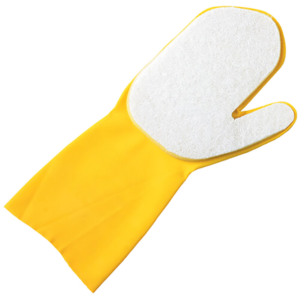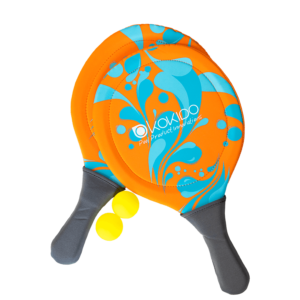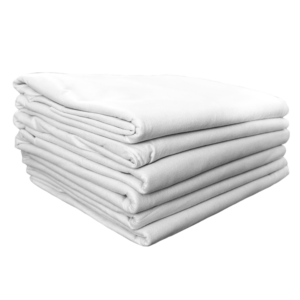
Caring For Your Vinyl Pool Liner — 25 Tips & Tricks
Your vinyl pool liner is an investment. If you want it to last and provide years of fun for your family, you have to take care of it. With that in mind, we’ve put together some handy tips and tricks to help you protect your vinyl pool liner from tears, leaks, fading, and other damage.
1. Don’t overuse or underuse chemicals.
Overusing chemicals — like bleach, pool shocks, and chlorine — can cause stains, fading, wrinkles, corrosion, and make your liner brittle. Along the same lines, not using chemicals to keep your water clean and balanced can also cause issues, including algae growth, which can stain your liner or lead to fading.
2. Keep the water chemistry balanced.
Overall, it’s best to test your water chemistry frequently (at least weekly — but more often if you’re in the pool on a regular basis) and make sure levels are appropriate. Ideal levels are as follows:
- Chlorine: 1.0-2.0 ppm
- pH: 7.2-7.8
- Calcium Hardness: 180-220 ppm
- Alkalinity: 80-120 ppm
- Dissolved solids: below 5000 ppm
- Cyanuric Acid: 40-80 ppm
- Chloramine: Below 0.4 ppm
3. Always read the directions.
When using chemicals, be sure to follow all directions and safety guidelines noted by the manufacturer of both your pool liner and the chemicals. Accidentally mixing the wrong chemicals, using the wrong amounts, or adding them at the wrong time may not only damage your liner, but can cause chemical reactions that can be dangerous to humans and pets or cause the chemicals to be ineffective.
4. Don’t cover your pool after adding chemicals…
 You want to wait at least 24 hours before covering your pool with a pool cover after you add chemicals. Creating a closed environment can cause chemical concentrations that can damage your liner. Be sure to test the water again before adding your cover.
You want to wait at least 24 hours before covering your pool with a pool cover after you add chemicals. Creating a closed environment can cause chemical concentrations that can damage your liner. Be sure to test the water again before adding your cover.
5. …but cover it other times when not in use.
Covering your pool when you’re not using it helps prevent unnecessary weathering and keeps the sun from fading your liner. It also keeps out debris and wild animals that could cause scratching and other damage.
Shop Now:
Sturdy Man Pool Covers – Round
Sturdy Man Pool Covers – Oval
Essential Pool Cover – Round
Essential Pool Cover – Oval
6. Avoid floating chlorinators.
These can create uneven chlorine dispersion throughout the pool, which can cause fading or staining in specific spots on your liner when it gets too concentrated.
 7. Only use cleaning tools intended for vinyl pool liners
7. Only use cleaning tools intended for vinyl pool liners
This almost goes without saying, but yet we need to say it. Oftentimes people use abrasive scrubbers that they have on hand for cleaning the house, like steel wool and scratcher pads, which are too rough for the liner and leave marks. Another common issue is using vacuum heads or other tools meant for cement pools, not vinyl liners. These types of tools are generally too rough and cause holes and other damage.
Shop Now:
SCRUB-O Pool & Spa Scrubbing Mitt
8. Clean your pool regularly.
Cleaning your pool consistently helps prevent staining and discoloration. If you’re cleaning and maintaining your pool regularly, you’re also likely to notice damage, leaks, and other issues before they become a major (and costly) problem.
9. Pay special attention to the waterline and corners when cleaning
When cleaning, you want to make sure you’re cleaning especially well around the waterline and hard-to-reach corners. These are common areas for debris, oil from your skin, and scum to build up, causing staining on the liner.
10. Don’t drain your swimming pool
Gravity and water pressure are necessary to hold your vinyl pool liner in place and prevent shrinking and other issues. Thus, draining your pool can cause damage to your liner and the pool structure itself. Generally, you should only drain your pool if you’re replacing the liner or under the guidance of a swimming pool professional. Most maintenance and repair tasks can be done without draining the pool.
11. Use caution when using sharp objects around the pool.
Be extra careful of sharp objects — such as tools, stones, sticks, and glass — around your pool. These items can easily cause rips and tears in your liner. Store your grilling accessories, power tools, and other backyard necessities when you’re done using them. You’ll also want to keep a close eye on kids to prevent them from throwing sticks, rocks, and other foreign objects into the pool.
 12. Only allow pool toys in the pool.
12. Only allow pool toys in the pool.
Opt for water-friendly pool toys, like dive sticks and floats, and leave the Barbie dolls, Legos, robots, and other toys inside. While they may seem harmless, these toys can potentially poke holes and cause damage to your liner.
Shop Now:
Set of 3 Neoprene Dive Sticks
Neoprene Glove & Ball Set
Neoprene Catch Ball Set
Set of 2 Neoprene Paddles & 2 PVC Balls
13. Avoid using glass and other breakables around the pool.
Broken glass is not only a hazard for the humans wandering barefoot around your patio area, but it can also scratch and damage your pool liner. When possible, opt for plastic and other pool-friendly, reusable options to avoid accidental damage from broken glass.
14. Always wear proper swimwear in the pool.
While it may be tempting to just jump in on a hot day, be sure you and other swimmers change into proper swimming attire. Buttons, zippers, and metal clasps found on your normal clothes can potentially damage your liner. Random items, such as keys or pocket knives, left in your pocket also pose a risk to your liner if they find their way into your pool. You should also remove your shoes or opt for water shoes while swimming.
15. Remove jewelry before entering the pool.
Sharp charms on bracelets, necklaces, and earrings have the potential to damage your liner. Plus, the chemicals used in your pool can potentially cause wear and tear on your jewelry and gems. Overall, your safest bet is to take off jewelry before swimming.
16. Avoid metal/plastic hair accessories.
If you plan to pull your hair back while swimming, we recommend soft ponytail holders and scrunchies or cloth/elastic headbands. Metal hair clips, bobby pins, and other plastic hair accessories can potentially damage your liner if they accidentally fall out.
17. Beware of heat.
Candles, grills, tiki torches, and backyard campfires can cause melting, burns, and scorch marks if they accidentally get too close to your liner.
- Keep all heat sources a safe distance from the pool/liner.
- Extinguish flames before leaving the pool area.
- Keep candles, sparklers, and other fireworks away from the pool during celebrations like Fourth of July or birthdays.
18. Follow instructions when installing your liner.
We often see damage happen during the liner installation process. Make sure you’re following all instructions and taking care of your liner during this important step.
- Use caution when opening packaging to avoid accidentally slicing the liner with a knife.
- Clean the area around your pool before installing your new vinyl liner. Sticks and other debris could possibly puncture your liner.
- Make sure it’s warm enough. Your new liner should be installed when it’s 80 degrees and sunny or your liner may not work as well.
Read Now:
Complete Guide for Installing Your Above Ground Pool Liner
 19. Use a liner pad.
19. Use a liner pad.
If you’re installing a new liner, consider using a liner pad. Liner pads are affordable and add an extra layer of cushioning and protection that helps reduce the risk of leaks, tears, and punctures.
Shop Now:
Liner Pad – Round
Liner Pad – Oval
Liner Pad – Rectangle
20. Gently clean your vinyl pool liner
To prevent dirt and debris from accumulating in your above ground pool, you’ll want to wipe down your vinyl pool liner with a tool meant for gently cleaning vinyl liners. As you clean around your pool’s waterline, ensure that you clean the hard-to-reach areas around ladders, skimmers, or returns.
If you’re looking for a tool to help you to clean your vinyl pool liner gently, we have our Scrub-O Pool & Spa Scrubbing Mitt – made of a latex glove bonded to a scrubber pad, allowing you to scrub your pool liner with your hand easily!
21. Avoid weathering and buildup
The sun can cause your above ground vinyl pool liner to age prematurely. When you’re not using your pool, make sure to cover it — dirt and debris can build up around your pool around the waterline. To eliminate unnecessary debris, you’ll want to keep this clean using the Scrub-O Pool & Spa Scrubbing Mitt and your above ground pool cover.
If you don’t take the steps necessary to keep your pool safe from the elements and clean of buildup, your vinyl liner could become stained, fade, and have long-term damage – causing you to replace your liner sooner rather than later.
22. Vacuum your above ground pool regularly
As you use your pool throughout the summer, it’s easy for grass and dirt to make their way into your above ground pool. Vacuuming your pool is one of the easiest ways to get rid of this debris in your pool, allowing you to keep your vinyl liner clean and in excellent condition!
When vacuuming your vinyl pool liner, you want to ensure that the vacuum is made for vinyl liners, not concrete pools. Purchasing a non-vinyl liner vacuum head is a common mistake pool owners make, causing scratches and tears in their liners! A vacuum created for a vinyl liner will have a soft and more delicate head for cleaning this surface.
23. Use vinyl-safe pool cleaners
When buying cleaning products, chemicals, and anything else for your pool, you’ll want to ensure that it’s made for a vinyl pool liner. Although vinyl liners are heavy-duty and durable, they still need proper care to last a long time and survive endless pool parties!
While you’re shopping for vinyl pool liner cleaners, check to see if they’re lightweight to reduce wear and tear on the liner, that the components on the cleaner are soft enough to be rubbed against the liner, and that the cleaning item won’t stick or become stuck to the liner itself. For any chemicals you’re purchasing for your pool, check to ensure that they’re gentle enough to use, and test your chemical mixtures to ensure that they aren’t too strong to be used in your pool.
24. Use tennis balls to absorb oils
Using a tennis ball is one of our favorite tips and tricks for caring for your vinyl pool liner! People use your pool throughout the summer and carry their oils from sweat, hair products, sunscreen, and more. Oils sit at the top of the water and can make buildup easier around the waterline of your above ground pool. The solution is to toss a tennis ball into your pool’s water! As the tennis ball floats around the water, the fibers on the ball will collect and absorb these oils to help to keep your pool cleaner longer.
25. Properly open and close your pool
Another common time for damage to occur is while you’re opening or closing your above ground pool for the season. Opening and winterizing your pool properly is essential to prevent damage and extend the life of your liner. As noted above, follow all instructions from your manufacturer, make sure the area around your pool is free of debris before opening/closing, and add chemicals appropriately.
Read Now:
How to Open Your Above Ground Pool in 14 Easy Steps
Everything You Need to Know About Winterizing Your Above Ground Swimming Pool
Hopefully, these tips will help you keep your liner looking and working great for years to come. If your current liner has seen better days or you want an upgrade, you’re in luck. We have a wide selection of bold, colorful liners to choose from. Find your perfect above ground pool liner today!
Read Now:
The Ultimate Guide for Choosing the Perfect Above Ground Pool Liner



